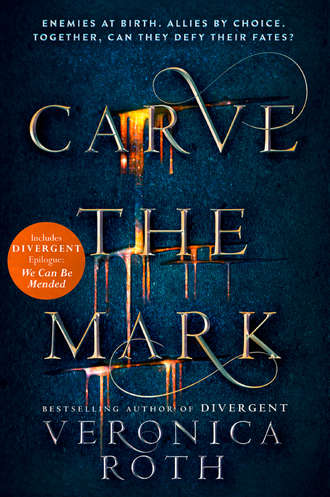
Полная версия
Carve the Mark
“Little thin-skinned boy,” the soldier spat. “You, as well as the rest of your pathetic kind, would do better to surrender now.”
“We are not pathetic!” Akos said. It was a stupid thing to say—something a little kid said when he didn’t know how to win an argument. But for some reason, it stopped everyone in their tracks. Not just the man with his hand clamped around Akos’s arm, but Cisi and Eijeh and Aoseh, too. Everyone stared at Akos, and—damn it all—heat was rushing into his face, the most ill-timed blush he had ever felt in all his life, which was saying something.
Then Vas Kuzar laughed.
“Your youngest child, I presume,” Vas said to Aoseh. “Did you know he speaks Shotet?”
“I don’t speak Shotet,” Akos said weakly.
“You just did,” Vas said. “So how did the family Kereseth find itself with a Shotet-blooded son, I wonder?”
“Akos,” Eijeh whispered wonderingly. Like he was asking Akos a question.
“I do not have Shotet blood!” Akos snapped, and all three of the Shotet soldiers laughed at once. It was only then that Akos heard it—he heard the words coming out of his mouth, with their sure meaning, and he also heard harsh syllables, with sudden stops and closed vowels. He heard Shotet, a language he had never learned. So unlike graceful Thuvhesit, which was like wind catching snowflakes in its updraft.
He was speaking Shotet. He sounded just like the soldiers. But how—how could he speak a language he had never learned?
“Where is your wife, Aoseh?” Vas said, turning his attention back to their dad. He turned the currentblade in his fist, so the black tendrils shifted over his skin. “We could ask her if she had a dalliance with a Shotet man, or if she shares our fine ancestry and never saw fit to tell you about it. Surely the oracle knows how her youngest son came to be fluent in the revelatory tongue.”
“She’s not here,” Aoseh said, terse. “As you may have observed.”
“The Thuvhesit thinks he is clever?” Vas said. “I think that cleverness with enemies gets a man killed.”
“I’m sure you think many foolish things,” Aoseh said, and somehow, he stared Vas down, despite being on the ground at his feet. “Servant of the Noaveks. You’re like the dirt I remove from under my fingernails.”
Vas swung at their dad, striking his face so hard he fell to the side. Eijeh yelled, fighting to get closer but intercepted by the Shotet who still held Akos’s arm. Held both brothers without effort, in fact, like it cost him nothing at all, though Eijeh, at sixteen seasons, was almost man-size.
The low table in the living room cracked right down the middle, from end to end, splitting in half and falling to each side. All the little things that had been on top of it—an old mug, a book, a few scraps of wood from their dad’s whittling—scattered across the floor.
“If I were you,” Vas said, low, “I would keep that currentgift under control, Aoseh.”
Aoseh clutched his face for a tick, and then dove, grabbing the wrist of the short, scarred Shotet soldier standing off to the side and twisting, hard, so his grip faltered. Aoseh grabbed the blade by the handle and wrenched it free, then turned it back on its owner, his eyebrows raised.
“Go ahead and kill him,” Vas said. “There are dozens more where he came from, but you have a limited number of sons.”
Aoseh’s lip was swollen and bleeding, but he licked the blood away with the tip of his tongue and looked over his shoulder at Vas.
“I don’t know where she is,” Aoseh said. “You should have checked the temple. This is the last place she would come, if she knew you were on your way here.”
Vas smiled down at the blade in his hand.
“It is just as well, I suppose,” he said in Shotet, looking at the soldier who held Akos with one hand and was pressing Eijeh to the wall with the other. “Our priority is the child.”
“We know which one is youngest,” the soldier replied in the same language, jerking Akos by the arm again. “But which of the other two is the second-born?”
“Dad,” Akos said desperately. “They want to know about the Smaller Child. They want to know which one of them is younger—”
The soldier released Akos, but only to swing the back of his hand at him, hitting him right in the cheekbone. Akos stumbled, slamming into the wall, and Cisi choked on a sob, bending over him, her fingers stroking her brother’s face.
Aoseh screamed through his teeth, and lunged, plunging the stolen currentblade deep into Vas’s body, right under the armor.
Vas didn’t even flinch. He just smiled, crookedly, wrapped his hand around the blade’s handle, and tugged the knife free. Aoseh was too stunned to stop him. Blood poured from the wound, soaking Vas’s dark trousers.
“You know my name, but you don’t know my gift?” Vas said softly. “I don’t feel pain, remember?”
He grabbed Aoseh’s elbow again, and pulled his arm out from his side. He plunged the knife into the fleshy part of their dad’s arm and dragged down, making him groan like Akos had never heard before. Blood spattered on the floor. Eijeh screamed again, and thrashed, and Cisi’s face contorted, but she didn’t make a sound.
Akos couldn’t stand the sight. It had him on his feet, though his face still ached, though there was no purpose to moving and nothing he could do.
“Eijeh,” he said, quiet. “Run.”
And he threw his body at Vas, meaning to dig his fingers into the wound in the man’s side, deeper and deeper, until he could tear out his bones, tear out his heart.
Scuffling, shouting, sobbing. All the voices combined in Akos’s ears, full of horror. He punched, uselessly, at the armor that covered Vas’s side. The blow made his hand throb. The scarred soldier came at him, and threw him to the floor like a sack of flour. He put his boot on Akos’s face and pressed down. He felt the grit of dirt on his skin.
“Dad!” Eijeh was screaming. “Dad!”
Akos couldn’t move his head, but when he lifted his eyes, he saw his dad on the ground, halfway between the wall and the doorway, his elbow bent back at a strange angle. Blood spread like a halo around his head. Cisi crouched at Aoseh’s side, her shaking hands hovering over the wound in his throat. Vas stood over her with a bloody knife.
Akos went limp.
“Let him up, Suzao,” Vas said.
Suzao—the one with his boot digging into Akos’s face—lifted his foot and dragged Akos to his feet. He couldn’t take his eyes off his dad’s body, how his skin had broken open like the table in the living room, how much blood surrounded him—how can a person have that much blood?—and the color of it, the dark orange-red-brown.
Vas still held the bloodstained knife out from his side. His hands were wet.
“All clear, Kalmev?” Vas said to the tall Shotet. He grunted in reply. He had grabbed Eijeh and put a metal cuff around his wrists. If Eijeh had resisted, at first, he was finished now, staring dully at their dad, slumped on the living room floor.
“Thank you for answering my question about which of your siblings we are looking for,” Vas said to Akos. “It seems you will both be coming with us, by virtue of your fates.”
Suzao and Vas flanked Akos, and pushed him forward. At the last second he broke away, falling to his knees at his dad’s side and touching his face. Aoseh felt warm and clammy. His eyes were still open, but losing life by the second, like water going down a drain. They skipped to Eijeh, who was halfway out the front door, pressed forward by the Shotet soldiers.
“I’ll bring him home,” Akos said, jostling his dad’s head a little so he would look at him. “I will.”
Akos wasn’t there when the life finally left his dad. Akos was in the feathergrass, in the hands of his enemies.


I WAS ONLY SIX seasons old when I went on my first sojourn.
When I stepped outside, I expected it to be into sunlight. Instead, I walked into the shadow of the sojourn ship, covering the city of Voa—the capital of Shotet—like a massive cloud. It was longer than it was wide, its nose coming to a gentle point with panes of unbreakable glass above it. Its metal-plated belly was battered by over a decade of space travel, but some of the overlapping sheets were polished where they had been replaced. Soon we would be standing inside it, like masticated food inside the stomach of a great beast. Near the rear jets was the open terminal where we would soon board.
Most Shotet children were permitted to go on their first sojourn—our most significant rite—when they were eight seasons old. But as a child of the sovereign, Lazmet Noavek, I was prepared for my first journey through the galaxy two seasons earlier. We would follow the currentstream around the galaxy’s edge until it turned darkest blue, and then descend to a planet’s surface to scavenge, the second part of the rite.
It was traditional for the sovereign and his or her family to enter the sojourn ship first. Or at least, it had been traditional since my grandmother, the first Noavek leader of Shotet, had declared it to be so.
“My hair itches,” I said to my mother, tapping at the tight braids on the side of my head with my fingertip. There were only a few, pulled back and twisted together so my hair wouldn’t fall in my face. “What was wrong with my regular hair?”
My mother smiled at me. She wore a dress made of feathergrass, the stalks crossed over the bodice and extending to frame her face. Otega—my tutor, among other things—had taught me that the Shotet had planted an ocean of feathergrass between us and our enemies, the Thuvhesit, to keep them from invading our land. My mother commemorated that clever act now, with her dress. By design, everything my mother did echoed our history.
“Today,” she told me, “is the first day that most Shotet will lay eyes on you, not to mention the rest of the galaxy. The last thing we want is for them to fixate on your hair. By fixing it up, we make it invisible. Understand?”
I didn’t, but I didn’t press the issue. I was looking at my mother’s hair. It was dark, like mine, but a different texture—hers was so curly it trapped fingers, and mine was just straight enough to escape them.
“The rest of the galaxy?” Technically, I knew how vast the galaxy was, that it held nine significant planets and countless other fringe ones, as well as stations nestled in the unfeeling rock of broken moons, and orbiting ships so large they were like nation-planets unto themselves. But to me, planets still seemed about as large as the house where I had spent most of my life, and no larger.
“Your father authorized the Procession footage to be sent to the general news feed, the one accessed by all Assembly planets,” my mother replied. “Anyone who is curious about our rituals will be watching.”
Even at that age I did not assume that other planets were like ours. I knew we were unique in our pursuit of the current across the galaxy, that our detachment from places and possessions was singular. Of course the other planets were curious about us. Maybe even envious.
The Shotet had been going on the sojourn once a season for as long as our people had existed. Otega had told me once that the sojourn was about tradition, and the scavenge, which came afterward, was about renewal—the past and the future, all in one ritual. But I had heard my father say, bitterly, that we “survived on other planets’ garbage.” My father had a way of stripping things of their beauty.
My father, Lazmet Noavek, walked ahead of us. He was the first to pass through the great gates that separated Noavek manor from the streets of Voa, his hand lifted in greeting. Cheers erupted at the sight of him from the huge, pulsing crowd that had gathered outside our house, so dense I couldn’t see light between the shoulders of the people before us, or hear my own thoughts through the cacophony of cheers. Here in the center of the city of Voa, just streets away from the amphitheater where the arena challenges were held, the streets were clean, the stones under my feet intact. The buildings here were a patchwork of old and new, plain stonework and tall, narrow doors mixed with intricate metalwork and glass. It was an eclectic mixture that was as natural to me as my own body. We knew how to hold the beauty of old things against the beauty of the new, losing nothing from either.
It was my mother, not my father, who drew the loudest cry from the sea of her subjects. She extended her hands to the people who reached for her, brushing their fingertips with her own and smiling. I watched, confused, as eyes teared up at the sight of her alone, as crooning voices sang her name. Ylira, Ylira, Ylira. She plucked a feathergrass stalk from the bottom of her skirt and tucked it behind a little girl’s ear. Ylira, Ylira, Ylira.
I ran ahead to catch up to my brother, Ryzek, who was a full ten seasons older than I was. He wore mock armor—he had not yet earned the armor made from the skin of a slain Armored One, which was a status symbol among our people—and it made him look bulkier than usual, which I suspected was on purpose. My brother was tall, but lean as a ladder.
“Why do they say her name?” I asked Ryzek, stumbling to keep up with him.
“Because they love her,” Ryz said. “Just as we do.”
“But they don’t know her,” I said.
“True,” he acknowledged. “But they believe they do, and sometimes that’s enough.”
My mother’s fingers were stained with paint from touching so many outstretched, decorated hands. I didn’t think I would like to touch so many people at once.
We were flanked by armored soldiers who carved a narrow path for us in the bodies. But really, I didn’t think we needed them—the crowd parted for my father like he was a knife slicing through them. They may not have shouted his name, but they bent their heads to him, guided their eyes away from him. I saw, for the first time, how thin the line was between fear and love, between reverence and adoration. It was drawn between my parents.
“Cyra,” my father said, and I stiffened, almost going still as he turned toward me. He reached for my hand, and I gave it to him, though I didn’t want to. My father was the sort of man a person just obeyed.
Then he swung me into his arms, quick and strong, startling a laugh from me. He held me against his armored side with one arm, like I was weightless. His face was close to mine, smelling of herbs and burnt things, his cheek rough with a beard. My father, Lazmet Noavek, sovereign of Shotet. My mother called him “Laz” when she didn’t think anyone could hear her, and spoke to him in Shotet poetry.
“I thought you might want to see your people,” my father said to me, bouncing me a little as he shifted my weight to the crook of his elbow. His other arm, returning to his side, was marked from shoulder to wrist with scars, stained dark to stand out. He had told me, once, that they were a record of lives, but I didn’t know what that meant. My mother had a few, too, though not half as many as my father.
“These people long for strength,” my father said. “And your mother, brother, and I are going to give it to them. Someday, so shall you. Yes?”
“Yes,” I said quietly, though I had no idea how I would do that.
“Good,” he said. “Now wave.”
Trembling a little, I extended my hand, mimicking my father. I stared, stunned, as the crowd responded in kind.
“Ryzek,” my father said.
“Come on, little Noavek,” Ryzek said. He didn’t need to be asked to take me from my father’s arms; he saw it in the man’s posture, as surely as I felt it in the restless shift of his weight. I put my arms around Ryzek’s neck, and climbed onto his back, hitching my legs on the straps of his armor.
I looked down at his pimple-spotted cheek, dimpled with a smile.
“Ready to run?” he said to me, raising his voice so I could hear him over the crowd.
“Run?” I said, squeezing tighter.
In answer, he held my knees tight against his sides, and jogged down the pathway the soldiers had cleared, laughing. His bouncing steps jostled a giggle from me, and then the crowd—our people, my people—joined in, my eyeline full of smiles.
I saw a hand up ahead, stretching toward me, and I brushed it with my fingers, just like my mother would. My skin came away damp with sweat. I found that I didn’t mind it as much as I expected. My heart was full.

THERE WERE HIDDEN HALLWAYS in the walls of Noavek manor, built for the servants to travel through without disturbing us and our guests. I often walked them, learning the codes that the servants used to navigate, carved into the corners of the walls and the tops of entrances and exits. Otega sometimes scolded me for coming to her lessons covered in cobwebs and grime, but mostly, no one cared how I spent my free time as long as I didn’t disturb my father.
When I was newly seven seasons old, my wanderings took me to the walls behind my father’s office. I had followed a clattering sound there, but when I heard my father’s voice, raised in anger, I stopped and crouched.
For a moment, I toyed with the idea of turning back, running the same way I had come so that I could be safe in my own room. Nothing good came of my father’s raised voice, and it never had. The only one who could calm him was my mother, but even she couldn’t control him.
“Tell me,” my father said. I pushed my ear to the wall to better hear him. “Tell me exactly what you told him.”
“I—I thought …” Ryz’s voice wobbled like he was on the verge of tears. That wasn’t good, either. My father hated tears. “I thought, because he is training to be my steward, that he would be trustworthy—”
“Tell me what you told him!”
“I told him … I told him that my fate, as declared by the oracles, was—was to fall to the family Benesit. That they are one of the two Thuvhesit families. That’s all.”
I pulled away from the wall. A cobweb caught on my ear. I hadn’t heard Ryzek’s fate before. I knew my parents had shared it with him when most fated children found out their fates: when they developed a currentgift. I would find out my own in a handful of seasons. But to know Ryzek’s—to know that Ryzek’s was to fall to the family Benesit, which had kept itself hidden for so many seasons we didn’t even know their aliases or their planet of residence—was a rare gift. Or a burden.
“Imbecile. That’s ‘all’?” my father said, scornful. “You think that you can afford trust, with a coward fate like yours? You must keep it hidden! Or else perish under your own weakness!”
“I’m sorry.” Ryz cleared his throat. “I won’t forget. I will never do it again.”
“You are correct. You will not.” My father’s voice was deeper now, and flat. That was almost worse than yelling. “We will just have to work harder to find a way out of it, won’t we? Of the hundreds of futures that exist, we will find the one in which you are not a waste of time. And in the meantime, you will work hard to appear as strong as possible, even to your closest associates. Understand?”
“Yes, sir.”
“Good.”
I stayed crouched there, listening to their muffled voices, until the dust in the tunnel made me want to sneeze. I wondered about my fate, if it would raise me up to power or cut me down. But now it felt more frightening than before. All my father wanted was to conquer Thuvhe, and Ryzek was destined to failure, fated to let my father down.
Dangerous, to anger my father with something you could not change.
I ached for Ryz, there in the tunnel, as I fumbled my way back to my bedroom. I ached, before I knew better.

A SEASON LATER, WHEN I was eight, my brother barged into my bedroom, breathless and soaked through with rain. I had just finished setting up the last of my figurines on the carpet in front of my bed. They were scavenged from the sojourn to Othyr the year before, where they had a fondness for small, useless objects. He knocked some of them over when he marched across the room. I cried out in protest—he had ruined the army formation.
“Cyra,” he said, crouching beside me. He was eighteen seasons old, his arms and legs too long, with spots on his forehead, but terror made him look younger. I put my hand on his shoulder.
“What is it?” I asked, squeezing.
“Has Father ever brought you somewhere just to … show you something?”
“No.” Lazmet Noavek never took me anywhere; he barely looked at me when we were in the same room together. It didn’t bother me. Even then, I knew that being the target of Father’s gaze was not a good thing. “Never.”
“That’s not exactly fair, is it?” Ryz said eagerly. “You and I are both his children, we ought to be treated the same. Don’t you think?”
“I … I suppose,” I said. “Ryz, what is—”
But Ryz just placed his palm on my cheek.
My bedroom, with its rich blue curtains and dark wood paneling, disappeared.
“Today, Ryzek,” my father’s voice said, “you will give the order.”
I was in a small dark room, with stone walls and a huge window in front of me. My father stood at my left shoulder, but he seemed smaller than he usually was—I only came up to his chest in reality, but in that room I stared right at his face. My hands were clenched in front of me. My fingers were long and thin.
“You want …” My breaths came shallow and fast. “You want me to …”
“Get yourself together,” my father growled, grabbing the front of my armor and jerking me toward the window.
Through it I saw an older man, creased and gray haired. He was gaunt and dead in the eyes, with his hands cuffed together. At Father’s nod, the guards in the next room approached the prisoner. One of them held his shoulders to keep him still, and the other wrapped a cord around his throat, knotting it tightly at the back of his head. The prisoner didn’t put up any protest; his limbs seemed heavier than they were supposed to be, like he had lead for blood.
I shuddered, and kept shuddering.
“This man is a traitor,” my father said. “He conspires against our family. He spreads lies about us stealing foreign aid from the hungry and the sick of Shotet. People who speak ill of our family can’t simply be killed—they have to be killed slowly. And you have to be ready to order it. You must even be ready to do it yourself, though that lesson will come later.”
Dread coiled in my stomach like a worm.
My father made a frustrated noise in the back of his throat, and shoved something into my hand. It was a vial sealed with wax.
“If you can’t calm yourself down, this will do it for you,” he said. “But one way or another, you will do as I say.”
I fumbled for the edge of the wax, peeled it off, and poured the vial’s contents into my mouth. The calming tonic burned my throat, but it took only moments for my heartbeat to slow and the edges of my panic to soften.
I nodded to my father, who flipped the switch for the amplifiers in the next room. It took me a moment to find the words in the haze that had filled my mind.
“Execute him,” I said, in an unfamiliar voice.
One of the guards stepped back and pulled on the end of the cord, which ran through a metal loop in the ceiling like a thread through the eye of a needle. He pulled until the prisoner’s toes just barely brushed the floor. I watched as the man’s face turned red, then purple. He thrashed. I wanted to look away, but I couldn’t.







